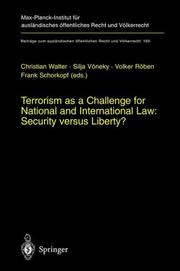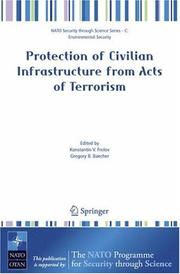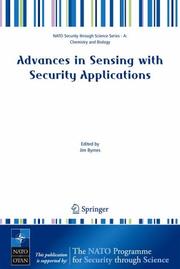| Listing 1 - 6 of 6 |
Sort by
|

ISBN: 2804800083 9782804800086 Year: 2004 Volume: *60 Publisher: Bruxelles Complexe
Abstract | Keywords | Export | Availability | Bookmark
 Loading...
Loading...Choose an application
- Reference Manager
- EndNote
- RefWorks (Direct export to RefWorks)
Terrorisme --- Terrorism --- International relations --- Prevention --- 343.34 --- 343.34 Terrorisme --- Terrorism - Congresses. --- Terrorism - Prevention - Congresses. --- International relations - Congresses.

ISSN: 01724770 ISBN: 3540212256 9783540212256 Year: 2004 Volume: Bd. 169 Publisher: Berlin Springer
Abstract | Keywords | Export | Availability | Bookmark
 Loading...
Loading...Choose an application
- Reference Manager
- EndNote
- RefWorks (Direct export to RefWorks)
International movements --- International law --- Terrorism --- National security --- Security, International --- Civil rights --- Human rights --- Prevention --- International cooperation --- Law and legislation --- Terrorism - Prevention - Congresses --- Terrorism - Prevention - International cooperation - Congresses --- National security - Law and legislation - Congresses --- Security, International - Congresses --- Civil rights - Congresses --- Human rights - Congresses
Book
ISBN: 9789601519845 9782802725091 960151984X Year: 2007 Publisher: Bruxelles : Bruylant,
Abstract | Keywords | Export | Availability | Bookmark
 Loading...
Loading...Choose an application
- Reference Manager
- EndNote
- RefWorks (Direct export to RefWorks)
Le présent volume est dédié à la promotion de la thèse que la politique anticriminelle - comme toute politique concernant des problèmes sociaux - doit être inspirée et pénétrée dans toutes ses étapes par les principes et les règles des droits de l'homme universellement reconnus. Il présente aussi, selon l'optique des droits de l'homme, quelques problèmes criminels particulièrement importants de l'âge d'or de la criminalité que nous sommes en train de traverser (délit organisé, terrorisme et anti-terrorisme etc.)
Human rights --- Crime prevention --- Terrorism --- Prevention --- Congresses --- Organized crime [Fight against ] --- Human rights - Congresses --- Crime prevention - Congresses --- Terrorism - Prevention - Congresses --- Droit international pénal --- Criminalité --- Sécurité privée --- Lutte contre le crime organisé --- Terrorisme --- Droits de l'homme --- Prévention --- Droit à la vie --- Art. 2

ISBN: 9781402049224 1402049226 1402049234 9786610716463 1280716460 1402049242 Year: 2006 Volume: v. 12 Publisher: Dordrecht, Netherlands : Springer,
Abstract | Keywords | Export | Availability | Bookmark
 Loading...
Loading...Choose an application
- Reference Manager
- EndNote
- RefWorks (Direct export to RefWorks)
1 2 Konstantine V. Frolov and Gregory B. Baecher 1 2 Director of the Institute for Machine Sciences, RAS; and University of Maryland The objective of the Workshop on Protection of Civilian Infrastructure From Acts of Terrorism was to lay the foundation for a risk-informed - proach to modeling, analyzing, predicting, managing, and controlling mul- sector Infrastructure networks in the face of human threats and errors. The goal was to combine the insights of a spectrum of disciplines across en- neering, public policy, planning, and economics. The workshop addressed the need to develop an understanding for s- tems behaviors and vulnerabilities of interacting networks; create a ri- informed analysis capability for modeling and predicting the behavior of complex networks; apply emerging technology to the problems of desi- ing, constructing, monitoring, and operating critical infrastructure; and build an understanding of the social, economic, and environmental factors that affect, and are affected by, critical infrastructure. The objective was to develop an understanding of the vulnerability of critical systems to various modes of terrorist attack. The benefit of developing such understanding is that approaches can be crafted to reducing vulnerability and to containing or limiting the propagation of failure within an infrastructure system, thus limiting the impact of terrorism. This also leads to improved understanding of infrastructure systems in general, not only in the face of threats but also natural hazards. Areas of research need and capability were identified, along with opportunities for future exchange and collaboration.
Terrorism --- Infrastructure (Economics) --- Terrorisme --- Prevention --- Congresses --- Security measures --- Prévention --- Congrès --- Infrastructure (Economics) -- Security measures -- Congresses. --- Terrorism -- Prevention -- Congresses. --- Social Welfare & Social Work --- Social Sciences --- Criminology, Penology & Juvenile Delinquency --- Capital, Social (Economics) --- Economic infrastructure --- Social capital (Economics) --- Social infrastructure --- Social overhead capital --- Engineering. --- Science. --- System theory. --- Mechanical engineering. --- Civil engineering. --- Civil Engineering. --- Mechanical Engineering. --- Systems Theory, Control. --- Science, general. --- Economic development --- Human settlements --- Public goods --- Public works --- Capital --- Science, Humanities and Social Sciences, multidisciplinary. --- Engineering, Mechanical --- Engineering --- Machinery --- Steam engineering --- Systems, Theory of --- Systems science --- Science --- Philosophy --- Systems theory.

ISBN: 9781402042843 1402042841 9786610427130 1280427132 1402042957 Year: 2006 Publisher: Dordrecht, Netherlands ; London, England : Springer,
Abstract | Keywords | Export | Availability | Bookmark
 Loading...
Loading...Choose an application
- Reference Manager
- EndNote
- RefWorks (Direct export to RefWorks)
The chapters in this volume were presented at the July 2005NATO Advanced Study Institute on Advances in Sensing with Security Applications. The conference was held at the beautiful Il Ciocco resort near Lucca, in the glorious Tuscany region of northern Italy. Once again we gathered at this idyllic spot to explore and extend the reciprocity between mathematics and engineering. The dynamic interaction - tween world-renowned scientists from the usually disparate communities of pure mathematicians and applied scientists which occurred at our six previous ASI’s continued at this meeting. The fusion of basic ideas in mathematics, biology, and chemistry with ongoing improvements in hardware and computation offers the promise of much more sophisticated and accurate sensing capabilities than currently exist. Coupled with the dramatic rise in the need for surveillance in innumerable aspects of our daily lives, brought about by hostile acts deemed unimaginable only a few short years ago, the time was right for scientists in the diverse areas of sensing and security to join together in a concerted effort to combat the new brands of terrorism. This ASI was one important initial step. To encompass the diverse nature of the subject and the varied backgrounds of the anticipated participants, the ASI was divided into three broadly defined but interrelated areas: the - creasing need for fast and accurate sensing, the scientific underpinnings of the ongoing revolution in sensing, and specific sensing algorithms and techniques. The ASI brought together world leaders from academia, government, and industry, with extensive multidisciplinary backgrounds evidenced by their research and participation in numerous workshops and conferences.
Detectors --- Remote sensing --- Chemical detectors --- Radar --- Terrorism --- Détecteurs --- Télédétection --- Détecteurs de produits chimiques --- Terrorisme --- Prevention --- Prévention --- Chemical detectors -- Congresses. --- Detectors -- Congresses. --- Remote sensing -- Congresses. --- Subjects Radar -- Congresses. --- Terrorism -- Prevention -- Congresses. --- Geography --- Electrical & Computer Engineering --- Engineering & Applied Sciences --- Earth & Environmental Sciences --- Electrical Engineering --- Geography-General --- Engineering. --- Analytical chemistry. --- Pattern recognition. --- Remote sensing. --- Applied mathematics. --- Engineering mathematics. --- Computer mathematics. --- Industrial engineering. --- Production engineering. --- Industrial and Production Engineering. --- Pattern Recognition. --- Remote Sensing/Photogrammetry. --- Applications of Mathematics. --- Computational Science and Engineering. --- Analytical Chemistry. --- Optical pattern recognition. --- Mathematics. --- Computer science. --- Analytical biochemistry. --- Math --- Science --- Optical data processing --- Pattern perception --- Perceptrons --- Visual discrimination --- Management engineering --- Simplification in industry --- Engineering --- Value analysis (Cost control) --- Analytic biochemistry --- Biochemistry --- Chemistry, Analytic --- Informatics --- Bioanalytic chemistry --- Bioanalytical chemistry --- Analytical chemistry --- Analysis, Chemical --- Analytic chemistry --- Chemical analysis --- Chemistry --- Computer mathematics --- Electronic data processing --- Mathematics --- Engineering analysis --- Mathematical analysis --- Remote-sensing imagery --- Remote sensing systems --- Remote terrain sensing --- Sensing, Remote --- Terrain sensing, Remote --- Aerial photogrammetry --- Aerospace telemetry --- Space optics --- Design perception --- Pattern recognition --- Form perception --- Perception --- Figure-ground perception --- Manufacturing engineering --- Process engineering --- Industrial engineering --- Mechanical engineering --- Sensing --- Security applications
Book
ISBN: 9048135036 9048135044 9048135028 Year: 2010 Publisher: Dordrecht, The Netherlands : Springer,
Abstract | Keywords | Export | Availability | Bookmark
 Loading...
Loading...Choose an application
- Reference Manager
- EndNote
- RefWorks (Direct export to RefWorks)
The basic logic is very simple. Countries around the globe have a need for more electrical generating capacity because of increases in population and increases in energy use per capita. The needs are constrained by the requirement that the ba- load energy source be economical, secure, and not emit climate-changing gases. Nuclear power fits this description. Therefore, many countries that have not had a nuclear power program (or only had a small program) see a need to develop one in the future. However, the development of a national nuclear energy program is not so simple. The purpose of the NATO Advanced Research Workshop on Nuclear Power and Energy Security was to contribute to our understanding of how these programs might evolve. The workshop took place 26–29 May 2009 in Yerevan, Armenia. Approximately 50 participants discussed the infrastructure that is needed and some of the reactor options that might be considered. The papers in this book helped define the discussion that took place. The infrastructure that is needed includes a legal framework, a functioning regulator, a plan for waste disposal, a plan for emergency response, etc. These needs were explained and just as importantly, it was explained what international, bilateral, and regional cooperation is available. Although there were many co- tries represented, the Armenian experience was of particular interest because of where the meeting was located. The papers on reactor options covered both innovative and evolutionary designs.
Energy policy -- Congresses. --- Nuclear energy -- Congresses. --- Nuclear energy -- Safety measures -- Congresses. --- Nuclear power plants -- Security measures -- Congresses. --- Nuclear terrorism -- Prevention -- Congresses. --- Security, International -- Congresses. --- Nuclear energy --- Nuclear power plants --- Nuclear terrorism --- Security, International --- Energy policy --- Safety measures --- Security measures --- Prevention --- Atomic power plants --- Nuclear power stations --- Power plants, Nuclear --- Atomic energy --- Atomic power --- Energy, Atomic --- Energy, Nuclear --- Nuclear power --- Power, Atomic --- Power, Nuclear --- Environment. --- Nuclear energy. --- Particle acceleration. --- Quality control. --- Reliability. --- Industrial safety. --- Nuclear engineering. --- Radiation protection. --- Radiation --- Environmental management. --- Environmental Management. --- Nuclear Engineering. --- Effects of Radiation/Radiation Protection. --- Particle Acceleration and Detection, Beam Physics. --- Quality Control, Reliability, Safety and Risk. --- Nuclear Energy. --- Safety measures. --- Terrorism --- Nuclear facilities --- Power-plants --- Antinuclear movement --- Force and energy --- Nuclear physics --- Power resources --- Nuclear engineering --- Environmental protection. --- System safety. --- Safety, System --- Safety of systems --- Systems safety --- Accidents --- Industrial safety --- Systems engineering --- Particles (Nuclear physics) --- Acceleration (Mechanics) --- Environmental quality management --- Protection of environment --- Environmental sciences --- Applied ecology --- Environmental engineering --- Environmental policy --- Environmental quality --- Environmental stewardship --- Stewardship, Environmental --- Management --- Acceleration --- Radiation—Safety measures. --- Industrial accidents --- Industries --- Job safety --- Occupational hazards, Prevention of --- Occupational health and safety --- Occupational safety and health --- Prevention of industrial accidents --- Prevention of occupational hazards --- Safety, Industrial --- Safety engineering --- Safety of workers --- System safety --- Dependability --- Trustworthiness --- Conduct of life --- Factory management --- Industrial engineering --- Reliability (Engineering) --- Sampling (Statistics) --- Standardization --- Quality assurance --- Quality of products --- Radiation monitoring --- Radiation protection
| Listing 1 - 6 of 6 |
Sort by
|

 Search
Search Feedback
Feedback About
About Help
Help News
News